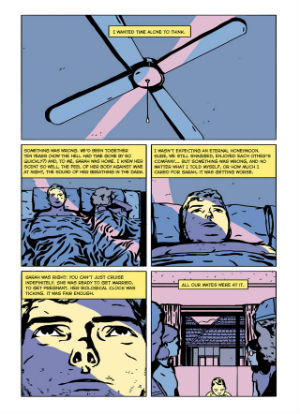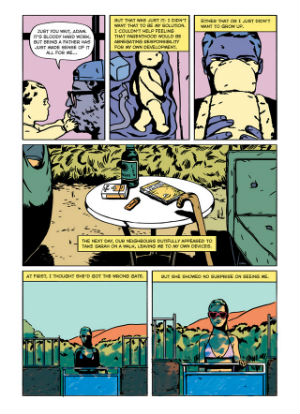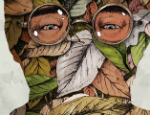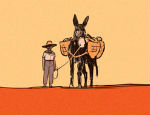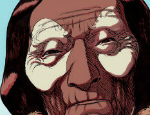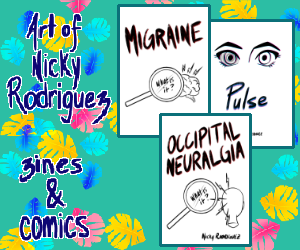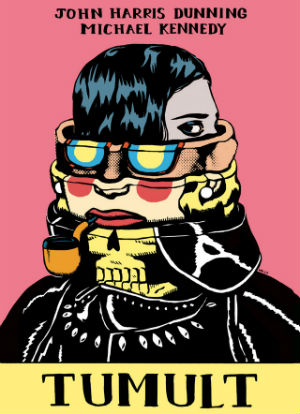 When we first meet central character Adam Whistler in John Harris Dunning and Michael Kennedy’s Tumult he’s a man in the midst of a self-destructive, existential crisis. The music video/commercials director’s insecurities are reflected in both a moment of holiday bravado that leaves him an invalid for the rest of his vacation and his self-absorbed, first person narration. A brief liaison with the very young daughter of fellow tourists will end his apparently perfect relationship and he returns home to London a man at a crossroads in his life.
When we first meet central character Adam Whistler in John Harris Dunning and Michael Kennedy’s Tumult he’s a man in the midst of a self-destructive, existential crisis. The music video/commercials director’s insecurities are reflected in both a moment of holiday bravado that leaves him an invalid for the rest of his vacation and his self-absorbed, first person narration. A brief liaison with the very young daughter of fellow tourists will end his apparently perfect relationship and he returns home to London a man at a crossroads in his life.
After sleeping with a woman named Morgan at a party he’s surprised that she appears to have no knowledge of him when he later meets her in the street, claiming her name is actually Leila. Becoming more entangled in her life, Whistler discovers that Morgan/Leila has multiple personalities and a deep mystery surrounds her past. When people orbiting her world start being killed that enigma becomes far darker in nature and the real question becomes who needs protection from whom…?
It’s a brave choice to present a protagonist who, from the outset, is so unlikeable (particularly in his attitude to women) that it’s difficult to empathise with them or to feel invested in them enough to fear any potential jeopardy. But, rather than being a sympathetic lead, the self-obsessed Whistler is largely an entry point into the greater puzzle that revolves around Morgan/Leila and her other personas, as we slowly begin to discover along with him the true nature of the forces that have shaped her for their own nefarious ends. It’s a mystery that is incrementally revealed not just in terms of plot points or events but also in the manner in which the reader is asked to piece together the disparate, fractured narrative segments; presentational approach suitably reflecting theme.
That’s also mirrored in Michael Kennedy’s art, particularly his intelligent colour choices that perfectly embody the atmosphere of individual scenes; from the oranges and deep cyan of the early holiday section to the moody hues that somehow manage to be both muted and yet almost hallucinogenic in the more psychological parts. It’s that use of colour, and Kennedy’s subtle shifts in perspective and close-ups, that constantly reflect the book’s ever off-kilter tone. Kennedy is also the artist on Vault Comics’s Spiritus and while this is his first graphic novel it’s a notably confident debut from a talent who bears very close watching in future.
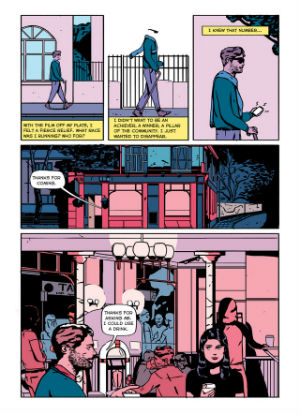 Taut and noir-ish, Tumult is the work of a writer who clearly understands exactly how to manipulate the specific storytelling possibilities of the form to ramp up the tension of this bleak and unforgiving thriller. Its deliberately disjointed narrative effectively disorients the reader to neatly match the experiences of its players but its ambition is perhaps not matched by its page count. Classic comic-style cutaways explore and explain Morgan’s multiple personalities; allusions to key points in cinema provide parallel takes on events; a recurring tarot card motif lends an air of fateful inevitability to the proceedings; and the movements in narration continually shift our attention around the cast. And, while that does indeed emphasise the fragmentary feel of Tumult with an appropriately discombobulating effect, additional space to develop and play with those techniques would have given the story more room to breathe.
Taut and noir-ish, Tumult is the work of a writer who clearly understands exactly how to manipulate the specific storytelling possibilities of the form to ramp up the tension of this bleak and unforgiving thriller. Its deliberately disjointed narrative effectively disorients the reader to neatly match the experiences of its players but its ambition is perhaps not matched by its page count. Classic comic-style cutaways explore and explain Morgan’s multiple personalities; allusions to key points in cinema provide parallel takes on events; a recurring tarot card motif lends an air of fateful inevitability to the proceedings; and the movements in narration continually shift our attention around the cast. And, while that does indeed emphasise the fragmentary feel of Tumult with an appropriately discombobulating effect, additional space to develop and play with those techniques would have given the story more room to breathe.
Ultimately, though, Tumult is ambitious in its use of those narrative tools unique to comics and unafraid to experiment and toy with them to present an unsettling and suspense filled drama. Visually literate and disconcerting in atmosphere, it’s a layered and twisting thriller that keeps the reader guessing until the very last pages.
John Harris Dunning (W), Michael Kennedy (A) • SelfMadeHero, £16.99
Review by Andy Oliver





